Today, we’re tackling an important question: Is it okay to turn off the water to your refrigerator?
Many homeowners wonder if shutting off the water supply can cause any harm or inconvenience.
In this article, we’ll explore the potential benefits and drawbacks of this decision, helping you make an informed choice for your home.
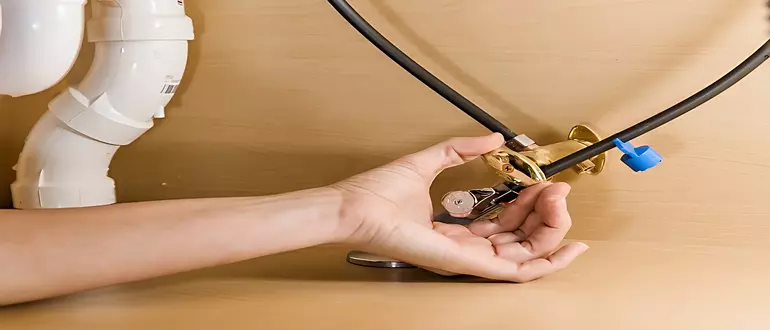
Is It Ok To Turn Off The Water To The Refrigerator?
Turning off the water in your refrigerator is absolutely fine. It’s a practical measure when going on vacation or doing maintenance. By doing so, you prevent leaks, save energy, and extend your appliance’s lifespan. Safely switch off the water when needed and enjoy worry-free refrigeration.
Potential Consequences of Turning off Water to the Refrigerator
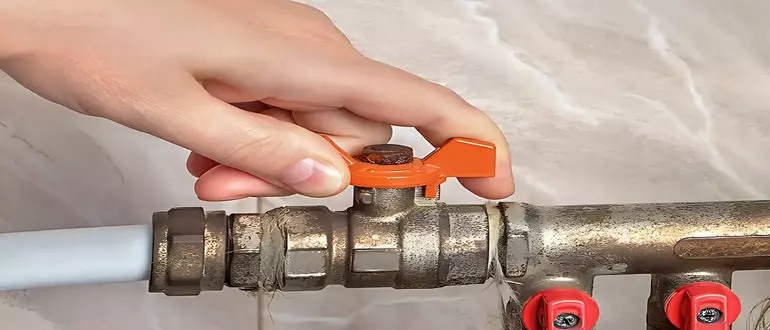
While turning off the water supply to your refrigerator can be necessary at times, it’s essential to be aware of the potential consequences.
Turning off the water supply can impact the performance of your refrigerator and cause issues with the ice maker and water dispenser.
Let’s explore some of the potential consequences of turning off the water supply to your refrigerator.
Ice Maker Malfunctions
If you turn off the water supply to your refrigerator, the ice maker may stop working correctly.
The ice maker relies on a steady supply of water to produce ice cubes, and turning off the water supply can cause the ice maker to malfunction.
You may notice that the ice maker produces smaller ice cubes or no ice at all.
Water Dispenser Issues
The water dispenser in your refrigerator may also be affected by turning off the water supply.
The water dispenser relies on a steady supply of water to provide clean drinking water, and turning off the water supply can cause the water dispenser to stop working altogether.
You may notice that the water dispenser produces little or no water, or the water may have an unusual taste or odor.
Damage to Water Supply Line
If you turn off the water supply to your refrigerator without properly draining the water supply line, it can cause damage.
Water left in the line can freeze and expand, causing the line to crack or rupture. This can result in water damage to your home and expensive repairs to your refrigerator.
Longer Cooling Time
The cooling time of your refrigerator may also be affected by turning off the water supply.
As we mentioned earlier, water is used to cool the compressor and regulate the humidity levels inside your refrigerator.
Turning off the water supply can cause the compressor to work harder to cool the refrigerator, resulting in longer cooling times and potentially higher energy bills.
How To Turn Off The Water To The Refrigerator Safely
Below, we’ll explore how to turn off the water to your refrigerator safely.
Locate the Water Shut-Off Valve
The valve is usually located behind the refrigerator or under the sink. Once you’ve located the valve, turn it clockwise to shut off the water supply.
Test the Water Supply
After you’ve turned off the water supply, it’s important to test it to ensure that the water has been successfully shut off.
You can do this by trying to dispense water from the refrigerator’s water dispenser or by checking for any leaks around the refrigerator or water supply line.
Drain the Water Supply Line
If you’re turning off the water supply for an extended period, it’s essential to drain the water supply line to prevent any potential damage.
You can do this by turning on a faucet or valve near the refrigerator to release any remaining water from the line.
Turn the Water Supply Back On
When you’re ready to turn the water supply back on, turn the shut-off valve counterclockwise to restore the water supply.
Once you’ve turned on the water supply, check the refrigerator’s water dispenser and ice maker to ensure that they’re functioning correctly.
Alternatives To Turning Off The Water In The Refrigerator
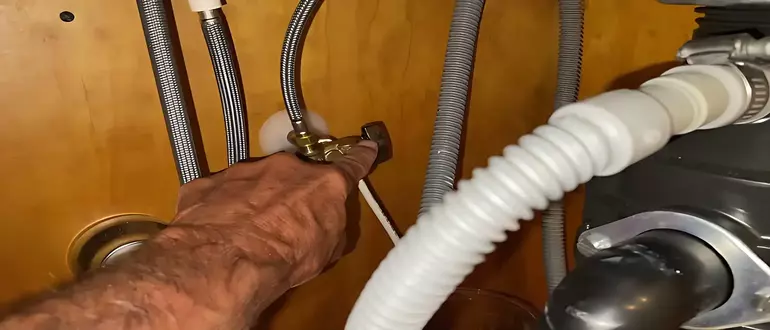
Using the Ice Maker’s On/Off Switch
If you need to temporarily stop the ice maker from producing ice, you can use the on/off switch located in the front of the ice maker.
Turning off the ice maker won’t affect the water supply to the refrigerator, and you can turn it back on when you’re ready to resume ice production.
Shutting off Individual Water Valves
If your refrigerator is connected to a dedicated water line, you may be able to shut off the water supply without affecting the rest of your home’s water supply.
You can do this by locating the individual water valve for the refrigerator’s water supply line and turning it off.
Using a Water Shut-Off Timer
If you need to turn off the water supply to your refrigerator regularly, you may want to consider installing a water shut-off timer.
A water shut-off timer can be programmed to turn off the water supply to your refrigerator at specific times of the day, and it will turn the water supply back on automatically.
Installing a Water Alarm
If you’re concerned about potential leaks or water damage, you can install a water alarm near your refrigerator.
A water alarm can detect any water leaks and alert you before any significant damage occurs.
This can be an effective alternative to turning off the water supply if you want to be alerted to any potential issues without shutting off the water supply completely.
Common Reasons for Turning off Water to the Refrigerator
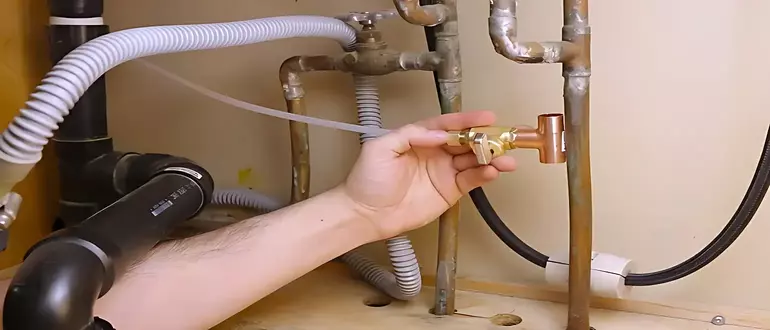
If you’re experiencing issues with your refrigerator, one of the troubleshooting steps you can take is to turn off the water supply.
There are several common reasons why you may need to turn off the water to your refrigerator.
Below, we’ll explore some of the most frequent causes of turning off the water supply to your refrigerator.
Repairing Leaks
One of the most common reasons for turning off the water supply to your refrigerator is to repair leaks.
If you notice water pooling around your refrigerator, it could be a sign that there is a leak in the water supply line or the ice maker.
Turning off the water supply can help prevent further damage to your home and appliances while you address the issue.
Replacing Water Filters
Water filters need to be replaced regularly to ensure that your refrigerator is providing clean and fresh-tasting water.
Turning off the water supply before replacing the filter can prevent water from leaking out and making a mess.
Cleaning the Refrigerator
If you need to clean the inside of your refrigerator thoroughly, you may need to turn off the water supply.
This is because the water supply is often connected to the ice maker and water dispenser, and turning it off can prevent water from being dispensed while you clean the inside of the refrigerator.
Moving or Installing a New Refrigerator
If you’re moving or installing a new refrigerator, you may need to turn off the water supply temporarily.
This is because you’ll need to disconnect and reconnect the water supply line to your new refrigerator or move the existing one to its new location.
Turning off the water supply can prevent water from leaking out during the process.
Understanding the Importance of Water in the Refrigerator
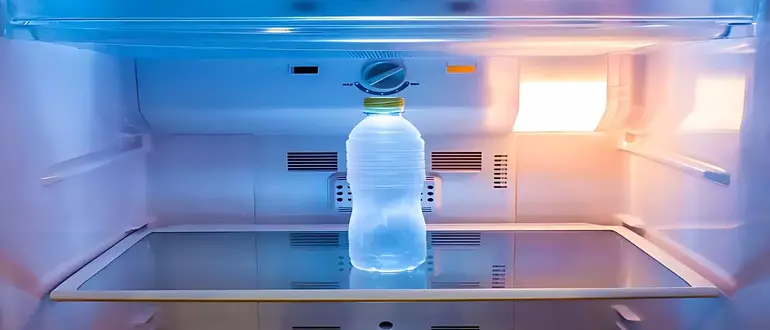
Let’s explore the significance of water in your refrigerator and why it’s important to keep it in good condition.
Cooling System
One of the most critical functions of water in your refrigerator is its role in the cooling system.
Water is used to cool the compressor, which is the central component of the cooling system.
The compressor generates heat as it operates, and this heat needs to be dissipated to keep the refrigerator cool.
Water is used to absorb this heat, and it is then released into the air through the condenser coils located at the back of the refrigerator.
Ice and Water Dispensers
Many modern refrigerators come with built–in ice and water dispensers, which rely on a water supply to function correctly.
These dispensers provide a convenient way to access clean drinking water and ice cubes without the need for additional appliances.
However, if the water supply is compromised, the quality of the ice and water can be affected, potentially leading to health issues.
Therefore, it is essential to keep the water supply clean and free from contaminants to ensure the safe consumption of water and ice.
Humidity Control
Water also plays a vital role in controlling the humidity levels inside your refrigerator.
Maintaining the proper humidity level is essential for preserving the quality and freshness of your food.
Too much humidity can lead to the growth of mold and bacteria, while too little humidity can cause food to dry out and become stale.
The evaporator coil in your refrigerator uses water to regulate the humidity levels, ensuring that your food stays fresh for longer periods.
Maintenance and Cleaning
To ensure that your refrigerator functions correctly, it is essential to maintain and clean it regularly.
This includes checking the water supply lines for leaks, replacing water filters when necessary, and cleaning the ice and water dispensers to prevent the buildup of contaminants.
Neglecting to maintain and clean your refrigerator can lead to costly repairs and a decrease in its overall lifespan.
FAQs
Are There Alternatives To Turning Off The Water Supply To My Refrigerator?
Yes, there are several alternatives to turning off the water supply to your refrigerator, including using the ice maker’s on/off switch, shutting off individual water valves, using a water shut-off timer, and installing a water alarm.
Can Turn Off The Water Supply To My Refrigerator Cause Any Damage?
If you turn off the water supply without properly draining the water supply line, it can cause damage. Water left in the line can freeze and expand, causing the line to crack or rupture. This can result in water damage to your home and expensive repairs to your refrigerator.
How Often Should I Replace My Refrigerator’s Water Filter?
It’s recommended to replace your refrigerator’s water filter every six months or when the filter indicator light comes on, whichever comes first. Regularly replacing the water filter can ensure that your refrigerator is providing clean and fresh-tasting water.
Final Words
Turning off the water to your refrigerator can be a viable option when going on vacation or performing maintenance.
By doing so, you protect against potential leaks, save energy, and prolong the life of your appliance.
So go ahead, and confidently switch off the water to your refrigerator when needed – it’s a smart move for both convenience and peace of mind.
